Listening to the stupid lyrics that for so many years, we have been dancing to, it’s difficult to imagine that the public grooved to the sound of the deep lyrics of the English poet Anne Clark. Since 1982 with the release of The Sitting Room she has been telling us her stories and worries in an essential series of honest albums. She will be one of the main reasons why on the 24th of August we will be assisting to the W-Fest that will take place in the Belgian city of Ostend.
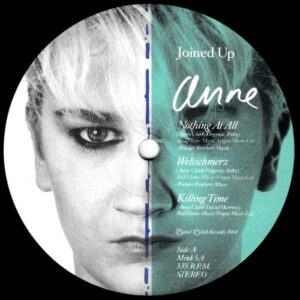 —How did you get interested in electronic music? I read that one of your first influences was Giorgio Moroder, right?
—How did you get interested in electronic music? I read that one of your first influences was Giorgio Moroder, right?
—Well, yes, Giorgio Moroder was amongst them, but I would say Tangerine Dream, Roxy Music and David Bowie were my biggest influences as far as electronic music is concerned.
—One of your first jobs was in a record store. Have you read the book (or watch the movie) High Fidelity? What kind of shop clerk were you?
—No, I haven’t read the book or seen the movie. Working in a record shop my dream job at the age of 14 (working there Saturdays). When I got offered a full-time job when I was older, how could I refuse?! Especially as it was at exactly the same time as Punk Rock was exploding in London.
I think I was a great shop clerk. I could advise on everything from Abba to Zappa.
—If I think of poetry and electronic music, I always think about you and Laurie Anderson. Were you interested in her music? I think that combining both worlds you have done things completely different.
—I loved Laurie Anderson’s Big Science album. I remember the “Oh Superman” single and it reaching the top of the UK Charts. It’s unimaginable that anything so experimental would even be exposed to the public by the music industry today! The late 70s and early 80s were incredibly exciting and innovative. Most of the more unique and individual artists didn’t survive the music industry’s “sweep-up” of the New Wave unfortunately.
I think Laurie Anderson’s involvement with the New York art scene has meant she has always reached a very open and eclectic audience.
—Your first album The Sitting Room, has as cover a painting by Dante Grabriel Rosetti, one of the Pre-Raphaelites. Not something so common for an electronic album. Did you want to announce your poetic intentions already with this cover?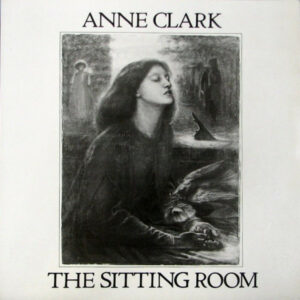
—Indeed! As well as being very involved in Punk and New Wave, I loved literature and poetry. The Pre-Raphaelite artists captured a mystical and nature-loving element that has always been essential for me.
—A curiosity, there is a song called Short Story (Party Mix!), Was there another mix or was it a kind of internal joke?
—Definitely an internal joke!
—In your second album, Changing Places, you collaborated with Vini Reilly in half of the tracks. How this idea of doing one side with David Harrow and the other with Vini was born? I am a big fan of his music, how was working with him?
—As you already observed in your earlier question, there has always been a poetic, diverse and wide-reaching intention with my work. It isn’t purely electronic and never has been. The more ‘acoustic’ elements are equally important for me, as my subsequent albums and live concert set-ups show.
Music is about emotion, responses to circumstances and events. Sometimes these feelings are loud and explosive. Sometimes they are quieter and more intimate. The texts I was writing at the time needed differing musical settings. Some worked with David Harrow’s electronics but I was also looking for a more nuanced collaboration.
I was a big fan of Vini Reilly’s and would go to as many of his concerts as possible. Quite simply I just approached him after a concert and asked if he would be interested in collaborating. I was delighted that he agreed! Working with him was very easy. Fast and spontaneous. We recorded everything in one day!
—During these days, hip-hop became quite popular. Were you interested in this style of music? Or its lyrics?
—I was completely stunned when I played in the USA and at the number of black audience members there were. Mostly guys into rap and hip-hop. That was an incredible affirmation for me. Rap has had a bad image, justifiably so in a lot of instances, with its reverence for violence and misogyny. However, there is a whole lot more going on if one takes the time to really look into it. Also, I have always loved the African American culture of oration. Great storytellers and preachers, politicians. Just reading or listening to Martin Luther King Jr. has to be one of the greatest experiences of language and communication.
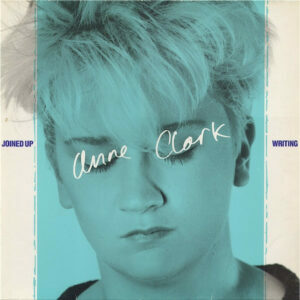 —And in the following album you worked with Virginia Astley, another artist that should get more recognition. How was working with her?
—And in the following album you worked with Virginia Astley, another artist that should get more recognition. How was working with her?
—Yes indeed. She definitely should have had more recognition. Working with her was also very easy and spontaneous. I love that way of working!
—In that album, Joined up Writing, you wrote the song “Weltschmerz.” The title makes reference to the feeling of melancholy or depression felt when we realized that the world around us is not like we would like it to be. Do you think is it a feeling that has been common in your life?
—Extremely. I used to find it impossible to conceive that people don’t feel despair at what we have done to the world and how little we care about it and each other. But now I realise that that kind of thinking is the exception, not the rule.
—And in Pressure Points you worked with electronic music pioneer John Foxx, another musician that we love at El Garaje. Again, we would like to know how was working with him and if you remember anything special of that work.
—It was a wonderful experience to work with John Foxx. He had been another big influence for me.
Working and collaborating with musicians is always unique. Each has their own approach and personality. Indeed Quiet Man is a very apt title for him! His approach and personality were very quiet and thoughtful in the studio.
—In Hopeless Cases we find a song called Cane Hill about your mental asylum where you worked. I guess it must have really impacted you. How biographical are your lyrics?
—Totally biographical. I hope the text captures the characters and personality not only of the patients there but also the building and its identity also.
These old 19th century “asylums” are looked back on with incredulity now, but I believe their original intention was a good one. They truly intended to offer asylum, refuge, to people. Cane Hill originally had its own farm, church, community within it. The running down of the health system, politics and human exploitation was the downfall of such places. Where do people find refuge today when they suffer serious mental illness?
—Just After Sunset was a curious album, where you sing some poems of classic German poet Rainer Maria Rilke. How this project was born? And how was working with Martyn Bates? Were you interested in the music of Eyeless in Gaza?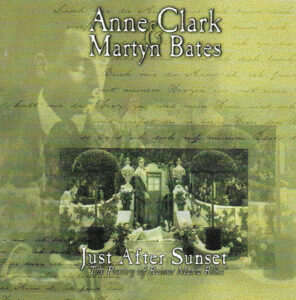
—It simply continues my love of poetry. Rilke is a poet of unfathomable depth. Reading his work is like a balm for the spirit.
As for Martyn Bates and Eyeless in Gaza, I feel they are amongst the most unique and inspirational artists of the 70s and 80s. They too reach unfathomable depths with sound and voice.
—And by the way, what poets have influenced your way of writing?
—Rilke obviously. There are so many it is impossible to list them all. It’s rather individual works by writers than artists themselves when it comes to poetry. Books, cinema, painting, theatre. I loved J.G. Ballard, Ivan Turgenev, lots of non-fiction, nature writing, Buddhist philosophy.
—Some of your works have a more neoclassical approach, like The Law Is An Anagram Of Wealth from 1993 and Homage the silent inside. Is this something that interests you for the future? How did you get into it?
—I’m not so sure I would really define any of my work as Neoclassicial. Rather, its a kind of minimal place. ‘Less is more’. We are so overloaded with everything, sometimes I just want to strip things back to basics. To keep things pure and simple, without ornamentation. I would call it more of a Zen approach.
—We will see Implant live in November and will try to interview him too. But first can you please tell us a bit about your collaborations with them?
—That’s going back a while!
I spend a lot of time in Belgium and got to know Len and Jan. It was good fun collaborating with people on a more casual and less demanding way. I think we did some nice things together!
—Your last album is entitled Synaesthesia and it’s a rework of some of your classics. Before, in 1997 there was Wordprocessing. According to you, what are the main differences between both projects?
—Synaesthesia represents current interpretations of my work, as Wordprocessing did back in 1997.
At a time when it was impossible for me to work live or in the studio directly with other musicians, I think it was a great option. I love the approach the producers took.
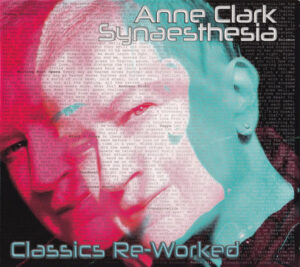 —What happened with the project Past and Future Tense? Are you going to continue it?
—What happened with the project Past and Future Tense? Are you going to continue it?
—I think Synaesthesia kind of took that over. It might be something worth considering in the future.
—I guess that these last two years have been quite difficult for you, are you feeling optimistic now that your illness and the pandemic seem gone?
—My illness will never be gone. It could come back at any moment. It is something I have to deal with in the best way I can. As for the pandemic – is it over? Maybe.
I do feel very inspired for sure and never take one moment of this beautiful life for granted. It’s just a shame that all the greed, violence and negativity in the world are so overwhelming.
—Did you like I’ll walk out into tomorrow, the documentary about your career?
—Of course it’s an honour to have a film made about one’s life and career but given the opportunity again I think I would be much more involved and take it in a very different direction.
—Do you know Kae Tempest? I think your influence can be traced in quite a lot of artists, and they could be one of them.
—I know her name but I don’t really know her work. I’m not sure if she knows me 🙂
—Your last work is a song made to support the people from Ukraine. How has this project worked so far? Do you think musicians should be more active politically?
—Well, I realise basically people mostly just don’t give a fuck. As I wrote in the accompanying press release – it’s no longer news. People in Europe are more concerned about their gas and electricity being turned off. Saying that, however, there are still some very generous people out there in these difficult times and I’d really like to thank them!
—You also wrote a song called Stop Brexit! in 2019. Now that Brexit happened, how has it affected your life?
—In lots of ways! Fortunately, I have Irish citizenship so that makes some things easier.
It is the most retrogressive act I think a country could have done. The EU is way less than perfect for sure, but to so aggressively break up the relationship with your closest neighbours and allies is idiocy beyond belief.
I believe it is all part of the intentional destabilization and weakening of Europe. I think Europe sadly becomes less influential with every passing day. Still – the British public got what it voted for.
Those people that chose Brexit truly believed they were going to put the UK back in the centre of world influence again. Instead the country is just a joke. Look at the shambles of a government the UK has. Even with the idiot Johnson gone, it is made up of the most corrupt self- serving bunch of ……. imaginable
—What can we expect in the future of Anne Clark? You are working on new songs, aren’t you?
—Indeed I am! I have a very exciting project in the pipeline!
—What can we expect of your concert at W-Fest? It will be your third time playing at the festival, right?
—Yes! It’s always a pleasure to be there! I will be with my amazing band of musicians – 3 of whom I celebrate 20 years of working together with this year! Come along and listen!




